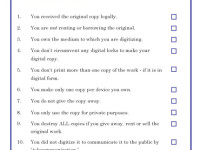Since the introduction of Bill C-61 two weeks ago, there has been extensive coverage and commentary in the Canadian media. I've created a Google Map that tracks the coverage – red indicates a negative review, yellow a neutral one, and blue represents positive coverage. There are links to all the […]

Fair Dealing by Giulia Forsythe (CC BY-NC-SA 2.0) https://flic.kr/p/dRkXwP
Copyright
Canadian DMCA Letter Writing Campaigns
There has been lots of attention paid to the huge growth of the Fair Copyright for Canada Facebook group (now over 81,000 members), but it is worth noting how many people have taken the time to write the government and their MPs over the past two weeks. The Copyright for […]
Copyright Bill is Plain Wrong
So says The Coast, based in Halifax.
61 Reforms to C-61, Day 4: Format Shifting’s 12 Step Approval Process
My final post on the format shifting exception focuses on the sheer complexity of the provision. The idea behind format shifting makes a great deal of sense – consumers buy books, photos, videos, and other content and want the right to view or enjoy the content on the device or medium of choice. Those rights can be priced into the purchase price and copyright law should facilitate that form of personal use.
Yet even beyond the digital lock limitation, the provision contains so many conditions that it will leave many Canadians unsure as to whether they have complied with the law. Just how complicated? The PDF chart below shows the 12 step process that Canadians must meet in order to comply. This is simply unworkable for all but a handful of lawyers. The government has said it wants to target commercial infringement, yet complicated provisions like this one send a different message. The law should be amended to keep format shifting, but with a simplified process.
61 Reforms to C-61, Day 4: Format Shifting’s 12 Step Approval Process
My final post on the format shifting exception focuses on the sheer complexity of the provision. The idea behind format shifting makes a great deal of sense – consumers buy books, photos, videos, and other content and want the right to view or enjoy the content on the device or medium of choice. Those rights can be priced into the purchase price and copyright law should facilitate that form of personal use.
Yet even beyond the digital lock limitation, the provision contains so many conditions that it will leave many Canadians unsure as to whether they have complied with the law. Just how complicated? The PDF chart below shows the 12 step process that Canadians must meet in order to comply. This is simply unworkable for all but a handful of lawyers. The government has said it wants to target commercial infringement, yet complicated provisions like this one send a different message. The law should be amended to keep format shifting, but with a simplified process.







